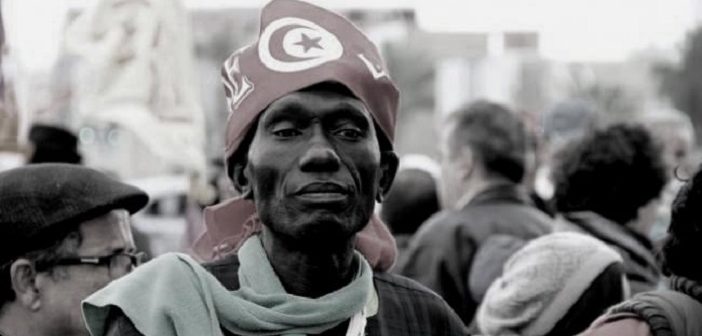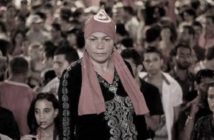I am sad for the Ivorian migrant that was killed last week but I am very angry for those who face racism every day. Racism that unintentionally or deliberately targets all who do not conform with the majority standards of beauty, religion, values, dialect and so on.
December 27th 2018 I was in a small coffee in La Marsa (Tunis) with two of my friends, four well-dressed ladies were sitting behind us discussing the story of the collective rape crimes that the French army committed in a Tunisian southern village during the colonization era. According to these ladies, all of the village inhabitants were originally ‘black and ugly like monkeys’ and nowadays big skin colors divergence between them is a result to this rape campaign. This scene took place two days after the assassination of the president of the Ivorian students association in Tunisia. I was shocked, the least to say before I realized that freedom and equality lose their impact when they are portrayed as a gift and not as a right.
In many countries, principles like tolerance, diversity and brotherhood are components of ceremonial discourse that political leaders and religious figures use in the national days and religious holidays. A lot of them refer to tolerance and not to coexistence, this is because they still see diversity acceptance as a favor and not as a principal or obligation. In Tunisia, these leaders tend to regularly remind us about what they call ‘the Tunisian exception’ and they keep telling us about the abolition of slavery decision of 1846 as a leading Human Rights protection act. However, this legal change did not deeply impact the Tunisian culture, social division, practices and traditions. It didn’t prohibit discrimination but it abolished human trafficking, it gave freedom to former slaves but it didn’t give equal rights, and it didn’t list punishment against the racist practices but sanctions against the organized crimes of human trafficking. It was not intended to change society practices but to change market transactions. The slavery abolition act of 1846 is still perceived as a gift from the then ruler Ahmed Bey and not as a right that was achieved by a part of the Tunisian society after a struggle against a discrimination practice and a racist system, nor as a principal that has its origins in the Tunisian culture and history.
Recently, after the Tunisian revolution of 2011, all the social and political discontents were institutionalized in form of civil society organizations and political parties that advocate for better socio-economic conditions, more job opportunities, just wealth distribution, and more political and individual freedoms and rights. These demands were upgraded to new socio-economic programs, social policies and a totally new political system. Equally, minorities’ voices rose up after 2011. Indeed, color-based minorities, LGBTQ communities, or ethnic or religious groups started mobilizing for their causes and organizing and legalizing themselves. However, their claims were under-presented in the public sphere and under-estimated by the majority that prioritized examining the security constraints and the political division over the cultural and demographic problems. Similarly to their situation under the dictator regime, minorities movements still are stigmatized and perceived as externally funded destabilization factors/actors and fake problems created to deviate attention fare from the real socio-economic and political problems.
Among other intolerance practices, skin color based discrimination is not a small matter, although many people and many countries tend to simplify or undermine its importance. This ignorance or deny exacerbates the situation because such problems need to be recognized and understood in order to be solved. We especially need to take the racial discrimination question out of the taboos list and give it its social and legal aspects. We need so, to make it clear that racism practices exist in our society and that we have to define and criminalize them. For example, mixed marriage between couples with divergent skin colors, is rare and socially unaccepted in some areas, something like that may cause dispute between families and may led one of the two person to be rejected by his/her relatives. In addition, in the Tunisian dialect, those who have dark skin are still called ‘Wsif’. Nevertheless, ‘Wsif’ is not a color; it is a social status and if to return to its origins in the Arabic language it means slave. It is to say an under citizen person. The use of this word reflects the normalization and the internalization of a discrimination practice in our culture, the practice of identifying people by their skin color. Furthermore, some Tunisians adopt a cross-cultural belief that still exists in autocratic regimes as well as consolidated and established democracies that categorizes people with darker skin colors as second level citizens. Some other people, and as a result to a distorted religious understanding that exists in many countries, still believe that the skin black color is sin and God’s punishment.
We surely are not in place to change a world where the old democracies still witness the rise of populism, discriminatory groups, nationalist governments, hate and racism crimes. However, the question is how to embed diversity in the Tunisian culture and politics? Do we need to fight the same bloody struggle like in USA or South Africa to convince the next generations that Afro-Tunisians and Sub-Saharan could be citizens or students or worker migrants and not slaves or lower race, and that they have the same rights and obligations? We urgently need to see people with different skin colors in the Tunisian school materials, TV shows, movies, series, patrol police stations, advertisements. We also need a solid and applicable legal basis to ingrain all kinds of diversity in our society. In Fact, it is the specificity of the Tunisian society to make social changes by the legislative bill. The public and obligatory education, the family planning and the polygamy abolition, all these leading changes took the form of laws and became part of the Tunisian pride and identity.
Accordingly, on January 13th 1967, Tunisia ratified the International Convention on the Elimination of all forms of racial discrimination that required the signatory States to adopt immediate and effective measures to eliminate all forms of discrimination. It took forty one years to alienate the Tunisian legislation with the international obligations in this field. In fact, three months ago, in October 23rd, 2018 the Tunisian parliament has ratified the Basic Law No. 50 on the Elimination of All Forms of Racial Discrimination. This new law gives guarantees and protection measures to those affected or vulnerable to the crimes of racial discrimination. It defined the discrimination crimes and listed the different sanctions for such crime. It has also introduced a new institution under the name of the National Committee against Racial Discrimination. We hope that these legal texts will be activated to make an impact. In fact, the success of the new Law and Committee is attached to the willingness of people to report discrimination practices and to publicly denounce them as well as the government’s willingness to apply this Law and to empower this institution.





